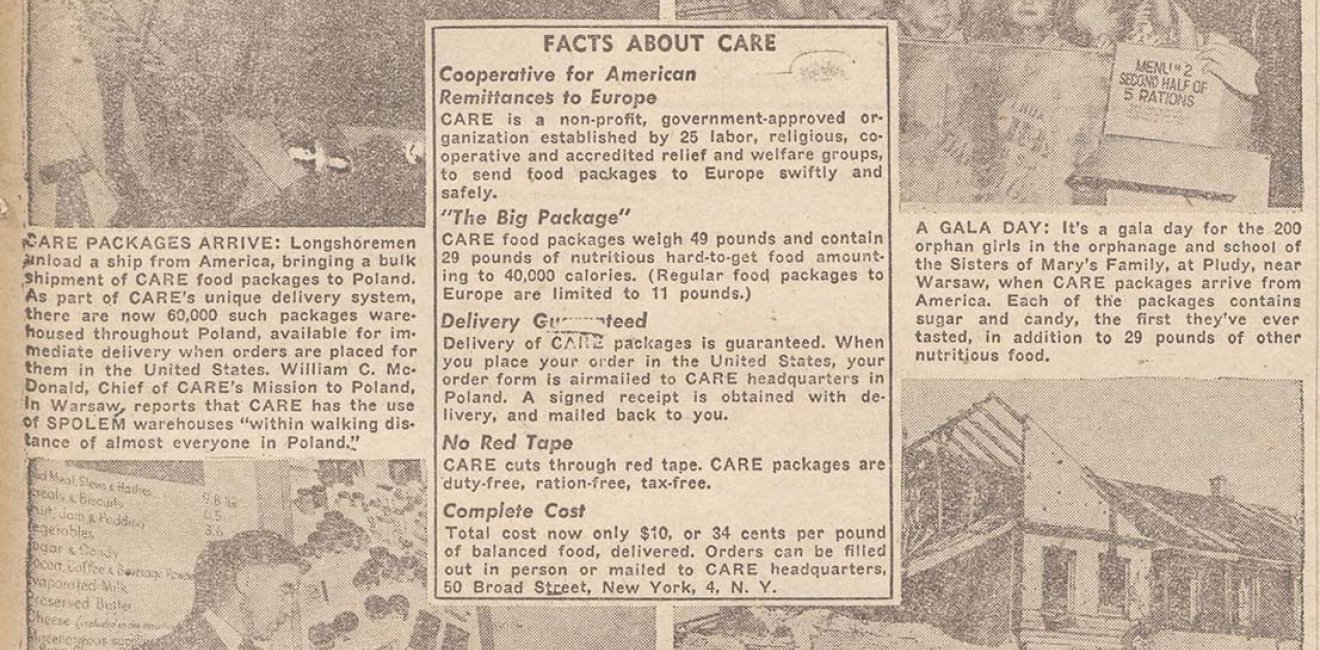Difficult Beginnings: The First CARE Mission to Poland, 1946-1949
The sudden rise and fall of the Cooperative for American Remittances to Europe (CARE) in Poland.

A blog of the History and Public Policy Program
The sudden rise and fall of the Cooperative for American Remittances to Europe (CARE) in Poland.

In February 1946, William N. Haskell, executive director of the Cooperative for American Remittances to Europe (CARE), wrote to Oskar Lange, the Polish ambassador in Washington, DC, explaining the CARE plan, and asking for his assistance in obtaining Polish government’s consent to its extension to Poland.Three months later, after lengthy and difficult discussions, Ludwik Grosfeld, deputy minister of shipping and foreign trade, signed a contract on behalf of the Polish government with his counterpart William McDonald, chief of the CARE mission to Poland. The Polish press covered the special ceremony, providing excellent publicity.
The first shipment of packages for Poland left New York on May 10, 1946, the same day that the final contract was signed. It consisted of 23,000 packages, out of a total initial allotment of 25,000 and was due to arrive at Gdansk on May 26.
The Polish government chose Społem, a Polish consumer co-operative founded in 1868, to be its agent for package distribution. Społem, which had a government-granted monopoly on all food imports into Poland, declared its readiness to immediately begin delivering packages and meet the expectations expressed in the contract.
The beginnings of CARE activities in post-war Poland were difficult due to the disastrous economic situation in the war-torn country. There were unending logistical problems with deliveries, recipients that no one could locate, and the constant threat of CARE’s goods ending up on the black market. However, as all parties involved attested, it was worth overcoming the difficulties as the food parcels were received by Poles with much gratitude. Relatives living abroad and numerous Polish diaspora organizations were involved in the shipment of these gifts, as a clipping from Sokół Polski on October 24, 1946, demonstrates.
The Communists ruling Poland initially warmly welcomed support from foreign aid organizations. This changed in the late 1940s as Moscow placed trusted Communist leaders in power who were under pressure to reject contact with the West. The activities of CARE and other similar organizations began to be seen as unwanted foreign agents. CARE was treated with indifference, impatience, and finally, unconcealed hostility. The impossibility of continuing operations in Poland became unmistakably clear on 26 October 1949 when Czesław Bajer, undersecretary of state for the Ministry of Foreign Affairs, stated that “the Polish Government would not tolerate the CARE administration in the country after December 1.”
The Polish CARE mission was formally closed by its head, George Goodfellow on December 31, 1949. During CARE’s activity in Poland from May 1946 to December 1949, it delivered 201,872 packages valued at US$ 2,067,528.50 in total.
CARE operated in Poland over the course of three missions between 1945 and 1990: the first from 1946–1949, when the organization supported Polish citizens after the war, the second from 1958–1970, when they resumed their activities in the wake of political reforms in 1956, and finally from 1981–1984, in response to the economic crisis in Poland after Polish government’s declaration of martial law.

A leader in making key foreign policy records accessible and fostering informed scholarship, analysis, and discussion on international affairs, past and present. Read more


The Cold War International History Project supports the full and prompt release of historical materials by governments on all sides of the Cold War. Read more



